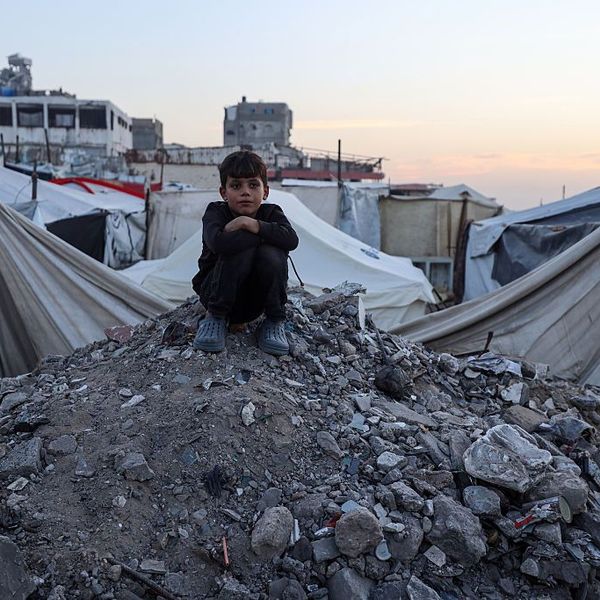Israel's Seizure of Palestinian Taxes Sparks Economic Devastation, Mounting Resistance
Palestinian officials warn economy is teetering and government is close to default
As Israel continues to withhold $130 million a month in revenue from the Palestinian Authority, officials warn that the West Bank's already choked economy is teetering over the edge, with most public employees facing salary cuts of 40 percent or more and the government close to default.
"We have informed the Palestinian Authority that we have reached the limits permitted to them, or are about to get there, and that banks will not be able to continue to fund it," Palestinian central bank Governor Jihad al-Wazir told Reuters on Wednesday.
"The situation in general is very tough," al-Wazir continued. "Suspending the tax transfers is leading to a rapid economic deterioration."
Ordinary people are bearing the brunt of these policies. Reuters reports:
Nidal Sadqa is a 47-year-old father of four who works for the Palestinian economy ministry in Ramallah and for the past three months he has been paid 60 percent of his usual salary. Half of what's left each month pays bank loans and other debts.
"I haven't paid the rent for three months and I owe the supermarket for things I've already taken," he said, describing circumstances familiar to the nearly 160,000 people employed by the Palestinian Authority in Gaza and the West Bank.
Israel froze the tax revenue in early January in retaliation for the PA's formal application to join the International Criminal Court. Since then, it has withheld over $500 million. These funds account for approximately two thirds of the PA's budget and are used to pay tens of thousands of public employees, according to Haaretz.
In response, Palestinians are reinvigorating a boycott of Israeli companies, specifically targeting Tnuva, Elite, Strauss Osem, Prigat, and Jafora. This escalation is a "first step against arbitrary Israeli procedure," according to a statement from the Palestinian Farmers' Union. While not a new tactic, reports indicate that the latest boycott marks an escalation, with Palestinians taking the step of confiscating and dumping Israeli goods.
Called by numerous Palestinian factions, including Fateh, the boycott shows "grassroots movements are compelling the Palestinian Authority -- the largest employer in the West Bank and Gaza Strip, but derided for 'security coordination' with the Israeli army -- to adopt the rhetoric of boycott, according to Rosie Lyse-Thompson writing for The Electronic Intifada.
Alaa Tartir of the Palestinian Policy Network argued last week in The Huffington Post that many believe Israel is trying to dismantle the PA altogether, and this might not be all bad.
Such developments "would alter the imbalance of power, expose the international community and the aid industry, force Israel to deal with the costs of its occupation, and allow the Palestinians to re-set their priorities and agenda, while possibly reinventing their political system," Tartir argued.
"The PA remains a product created by the international community, and not by the Palestinian people," he added.
An Urgent Message From Our Co-Founder
Dear Common Dreams reader, The U.S. is on a fast track to authoritarianism like nothing I've ever seen. Meanwhile, corporate news outlets are utterly capitulating to Trump, twisting their coverage to avoid drawing his ire while lining up to stuff cash in his pockets. That's why I believe that Common Dreams is doing the best and most consequential reporting that we've ever done. Our small but mighty team is a progressive reporting powerhouse, covering the news every day that the corporate media never will. Our mission has always been simple: To inform. To inspire. And to ignite change for the common good. Now here's the key piece that I want all our readers to understand: None of this would be possible without your financial support. That's not just some fundraising cliche. It's the absolute and literal truth. We don't accept corporate advertising and never will. We don't have a paywall because we don't think people should be blocked from critical news based on their ability to pay. Everything we do is funded by the donations of readers like you. Will you donate now to help power the nonprofit, independent reporting of Common Dreams? Thank you for being a vital member of our community. Together, we can keep independent journalism alive when it’s needed most. - Craig Brown, Co-founder |
As Israel continues to withhold $130 million a month in revenue from the Palestinian Authority, officials warn that the West Bank's already choked economy is teetering over the edge, with most public employees facing salary cuts of 40 percent or more and the government close to default.
"We have informed the Palestinian Authority that we have reached the limits permitted to them, or are about to get there, and that banks will not be able to continue to fund it," Palestinian central bank Governor Jihad al-Wazir told Reuters on Wednesday.
"The situation in general is very tough," al-Wazir continued. "Suspending the tax transfers is leading to a rapid economic deterioration."
Ordinary people are bearing the brunt of these policies. Reuters reports:
Nidal Sadqa is a 47-year-old father of four who works for the Palestinian economy ministry in Ramallah and for the past three months he has been paid 60 percent of his usual salary. Half of what's left each month pays bank loans and other debts.
"I haven't paid the rent for three months and I owe the supermarket for things I've already taken," he said, describing circumstances familiar to the nearly 160,000 people employed by the Palestinian Authority in Gaza and the West Bank.
Israel froze the tax revenue in early January in retaliation for the PA's formal application to join the International Criminal Court. Since then, it has withheld over $500 million. These funds account for approximately two thirds of the PA's budget and are used to pay tens of thousands of public employees, according to Haaretz.
In response, Palestinians are reinvigorating a boycott of Israeli companies, specifically targeting Tnuva, Elite, Strauss Osem, Prigat, and Jafora. This escalation is a "first step against arbitrary Israeli procedure," according to a statement from the Palestinian Farmers' Union. While not a new tactic, reports indicate that the latest boycott marks an escalation, with Palestinians taking the step of confiscating and dumping Israeli goods.
Called by numerous Palestinian factions, including Fateh, the boycott shows "grassroots movements are compelling the Palestinian Authority -- the largest employer in the West Bank and Gaza Strip, but derided for 'security coordination' with the Israeli army -- to adopt the rhetoric of boycott, according to Rosie Lyse-Thompson writing for The Electronic Intifada.
Alaa Tartir of the Palestinian Policy Network argued last week in The Huffington Post that many believe Israel is trying to dismantle the PA altogether, and this might not be all bad.
Such developments "would alter the imbalance of power, expose the international community and the aid industry, force Israel to deal with the costs of its occupation, and allow the Palestinians to re-set their priorities and agenda, while possibly reinventing their political system," Tartir argued.
"The PA remains a product created by the international community, and not by the Palestinian people," he added.
As Israel continues to withhold $130 million a month in revenue from the Palestinian Authority, officials warn that the West Bank's already choked economy is teetering over the edge, with most public employees facing salary cuts of 40 percent or more and the government close to default.
"We have informed the Palestinian Authority that we have reached the limits permitted to them, or are about to get there, and that banks will not be able to continue to fund it," Palestinian central bank Governor Jihad al-Wazir told Reuters on Wednesday.
"The situation in general is very tough," al-Wazir continued. "Suspending the tax transfers is leading to a rapid economic deterioration."
Ordinary people are bearing the brunt of these policies. Reuters reports:
Nidal Sadqa is a 47-year-old father of four who works for the Palestinian economy ministry in Ramallah and for the past three months he has been paid 60 percent of his usual salary. Half of what's left each month pays bank loans and other debts.
"I haven't paid the rent for three months and I owe the supermarket for things I've already taken," he said, describing circumstances familiar to the nearly 160,000 people employed by the Palestinian Authority in Gaza and the West Bank.
Israel froze the tax revenue in early January in retaliation for the PA's formal application to join the International Criminal Court. Since then, it has withheld over $500 million. These funds account for approximately two thirds of the PA's budget and are used to pay tens of thousands of public employees, according to Haaretz.
In response, Palestinians are reinvigorating a boycott of Israeli companies, specifically targeting Tnuva, Elite, Strauss Osem, Prigat, and Jafora. This escalation is a "first step against arbitrary Israeli procedure," according to a statement from the Palestinian Farmers' Union. While not a new tactic, reports indicate that the latest boycott marks an escalation, with Palestinians taking the step of confiscating and dumping Israeli goods.
Called by numerous Palestinian factions, including Fateh, the boycott shows "grassroots movements are compelling the Palestinian Authority -- the largest employer in the West Bank and Gaza Strip, but derided for 'security coordination' with the Israeli army -- to adopt the rhetoric of boycott, according to Rosie Lyse-Thompson writing for The Electronic Intifada.
Alaa Tartir of the Palestinian Policy Network argued last week in The Huffington Post that many believe Israel is trying to dismantle the PA altogether, and this might not be all bad.
Such developments "would alter the imbalance of power, expose the international community and the aid industry, force Israel to deal with the costs of its occupation, and allow the Palestinians to re-set their priorities and agenda, while possibly reinventing their political system," Tartir argued.
"The PA remains a product created by the international community, and not by the Palestinian people," he added.

